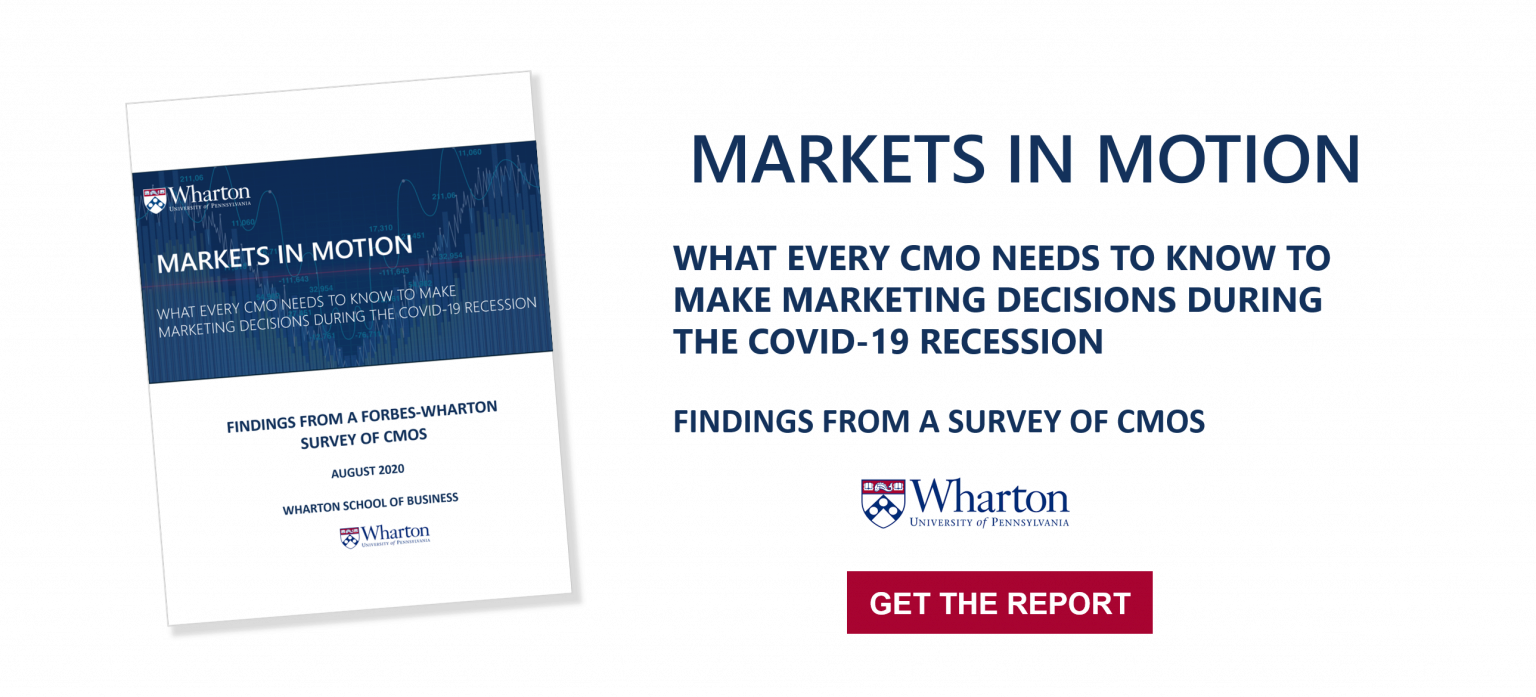The Markets in Motion Study:
What Every CMO Needs to Know to Make Marketing Decisions During The Covid-19 Recession
By David J. Reibstein, Stephen Diorio, and Raghu Iyengar
Marketers are in the midst of a unique pandemic induced recession. For many, it is their first as a business leader. The decisions they make during this recession have major and immediate implications for their future profits, competitiveness, and careers.
This study is designed to help CMOs learn from the past and make the best possible decisions about where, how, and when to invest to maximize firm revenues, profits, and share. A team of experts from The Wharton School examined how business leaders should adapt to the current recession in the context of history, known academic research, and a survey of 352 CMOs to understand the actions growth leaders are taking today in the wake of the Covid-19 recession.
This in-depth analysis of academic, business, and primary market research has two clear recommendations to business leaders:
1. Increase investing in marketing and innovation during the recession if you can. While conventional wisdom and current management behavior suggest cutting discretionary spending on marketing and innovation in the face of shrinking demand is the accepted course of action, historical facts suggest otherwise. At a time when 66% of businesses have cut spending on marketing and innovation, there is no evidence cutting spending in a recession improved profits, growth, or share in the short or long term. In fact, our analysis strongly indicates that investing during a recession is a smart and valuable investment, particularly through the lens of growing profits, share, and firm value. Yet, 10% of today’s CMOs told us they plan to increase growth investment during the recession.
2. If not, anticipate and prepare for significant changes. Another lesson is that business leaders should not expect a return to the status quo in the recovery. The facts show that recessions significantly restructure markets and only a fraction (under 10%) thrive in the following years. Many of the changes in customer behavior, sales force engagement, and general business models are not temporary but may lead to a fundamental change in behavior. A third of CMOs believe their go-to-market model will change forever as a direct result of this recession.
Marketing leaders have limited time or resources to make the difficult resource allocation and investment decisions they must make in the coming year. With planning for the 2021 fiscal year just months away. The decisions business leaders make about where to cut, invest, and refocus their growth resources will disproportionately define their future profitability and competitiveness in the new buying reality. With a reduced and, in many cases, negative cash flow it is hard to garner internal support for spending during the downturn. That said, the historical evidence is clear, the return per dollar spent may never be greater than what can be gained by spending at this time. This is important for both the short-term as well as the long-term. New leaders will be determined today that will persist into the future. The future of the business will be determined by how one spends in the present.
Markets in Motion Series with Raghu Iyengar and David Reibstein
Hear from marketing experts on how they are pivoting their business strategies and innovating in a time of disruption due to the COVID-19 pandemic.
Selorm Adadevoh, Chief Executive Officer of MTN, Ghana
Zack Anderson, CDAO at National Westminster Bank
Steve Barsh, Managing Partner of Dreamit Ventures
Jill Baskin, Chief Marketing Officer of The Hershey Company
Raj Beri, Global Head of Grocery and New Verticals at Uber
Jonnie Cahill, Chief Marketing Officer of Heineken USA
Amit Choudhary, COO and Executive VP of Global Financial Services SBU at Capgemini
Tina Edmundson, Global Brand & Marketing Officer at Marriott International
Christopher Gruits, Executive Director, Annenberg Center for Performing Arts
David Haigh, Chief Executive Officer at Brand Finance
Aimee Johnson, Chief Marketing Officer at Zillow
Angie Klein, VP of Consumer Segment Marketing at Verizon Wireless
Boyd Martin, US Equestrian Olympian
Brett McClung, President & Chief Executive Officer of Baptist Health
Santosh Misra, Commissioner of e-Governance for the Government of Tamil Nadu
Jamie Moldafsky, WG’89, Chief Marketing and Communications Officer at Nielsen
Tony Pace, President and Chief Executive Officer of Marketing Accountability Standards Board
David Rabin, Vice President of Global Commercial Marketing at Lenovo
Jill Renslow, EVP of Business Development and Marketing at Mall of America
Vineet Sharma, Chief Operations Officer at Pizza Hut Asia Pacific
Eric Stone, Chief Executive Officer & Co-Founder of Velano Vascular
Kate Sullivan, Director of Marketing and Branding at Philadelphia International Airport
Connie Weaver, Chief Marketing Officer of Equitable
Interviews with Stephen Diorio
David Reibstein, William Stewart Woodside Professor, Professor of Marketing
Raghu Iyengar, Professor of Marketing, and Faculty Director, AI and Analytics for Business
Related Articles
Recalibrating Your Customer Analytics Strategy
The pandemic-induced recession is the tipping point that is forcing businesses to accelerate the digital transformation of their commercial models. New research from the Wharton Business School, in collaboration with Forbes, confirms business leaders are shifting their budgets and management focus in digital channels to gain access to buyers, support virtual selling, and replace traffic and eyeballs from face-to-face trade shows, events, and storefronts.
Read more >>
Why CMOs Need to Consider Investing in Growth During This Recession
Growth leaders are in the midst of a unique pandemic induced recession. For many, it is their first as a business leader. For most, it is putting tremendous pressure on the decisions they make in 2021. “It is critical for growth leaders to learn from the past to make the right decisions during this recession because those actions will have major and immediate implications to their future profits, competitiveness, and career,” warns Professors David Reibstein, Professor of Marketing at the Wharton School of Business.
Read more >>



